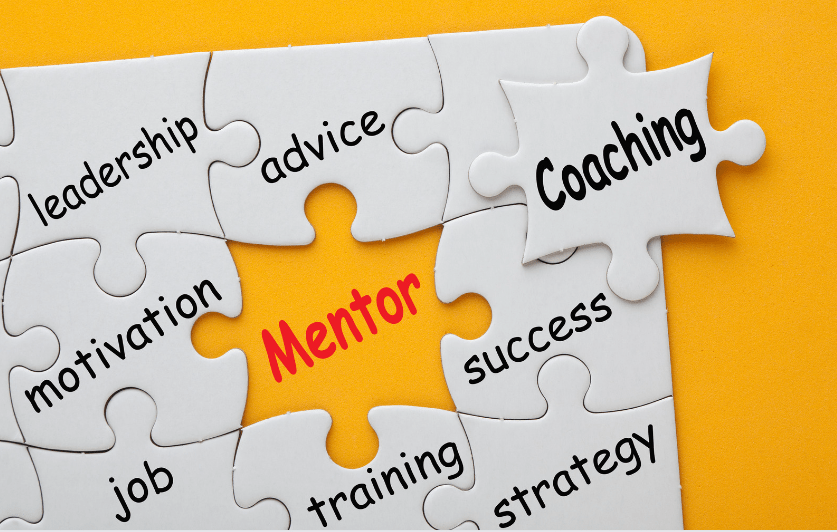
Mentoring is mentioned in the business acumen, is mentioned in all social networks, is mentioned in all industries.
It seems to be a trend. It is and at the same time it is present since the caveman times.
In the old times, we were sitting around the fireplace and were telling stories. And the wisest man was talking. Was talking about his experiences, how he overcame obstacles and shared his best practices. This was and is mentoring.
We had mentors and were mentees all along. And will be. Learning from our families. Our first mentors are our parents.

Now let’s look at the more professional side of mentoring.
What is mentoring exactly. Let’s go into the definition:
Mentoring is essentially about helping people to develop more effectively. It is a relationship designed to build confidence and support the mentee, so they can take control of their own development and work. The mentoring relationship is a collaborative partnership between a mentor, who is seen to have greater knowledge, skills and experience, and a mentee who is seeking to increase one or all these areas. It is an equal relationship of trust, guidance, and support.
What is a mentor:
A mentor empowers a person to see a possible future and believe it can be obtained. They also facilitate personal and professional growth in an individual by sharing the knowledge and insights that have been learned through the years. A mentor should have the qualities of experience, perspective, and distance, challenging the mentee and using candour to force reexamination and reprioritization. A great mentor has a knack for making us think we are better than we think we are. They force us to have a good opinion of ourselves, let us know they believe in us. They make us get more out of ourselves, and once we learn how good we really are, we never settle for anything less than our very best.
A successful Mentor supports professional growth and personal fulfillment for the Mentee:
- Develop and manage the Mentoring relationship
- Sponsor the Mentee’s developmental activities
- Motivate and inspire

Let’s look at each of these areas in more detail:
Develop and Manage the Mentoring Relationship
Mentoring is collaborative. The Mentor and the Mentee share responsibility for the success of the process. Successful Mentoring stands on a foundation of rapport, collaboration, respect, trust. As a Mentor, guide the conversation to reach common understanding and agreement about what is appropriate in the relationship and what is not, about what is and what is not being offered, and about the responsibilities of both parties. Help the Mentee to decide the most appropriate development objectives suitable for the Mentoring relationship.
Sponsor the Mentee’ s Developmental Activities
The Mentor is welcome to become an advocate for the Mentee, sponsoring for appropriate opportunities. The Mentor seeks ways to connect the Mentee with situations that provide visibility and development.
Teach:
-
- Giving information, resources, and direct training Giving honest and caring feedback
- Providing correction for inappropriate behaviours
- Helping to see inevitable errors that occur during the learning curve as developmental steps Assessing competencies, performance, and personal needs, attitude, and well-being
- Sharing relevant experiences from your career and life
Motivate and Inspire
Helping Mentees align their actions and goals with their values, passions, and sense of personal efficacy supports them in their development. The Mentor can awaken the creativity and innovative ideas in the Mentee and help them reach their potential. Some ways to inspire your Mentee are about:
-
- Making it safe for your Mentee to brainstorm
- Modelling creativity and innovation
- Providing a supportive realism for overly expansive or unrealistic thinking
- Asking questions and listening for what is important to the Mentee
- Encouraging and facilitating new perspectives. Reminding, that there are multiple right answers to questions and solutions to problems
- Supporting the quest for continuous improvement
How does mentoring interact:
- Establishing Trust and Intimacy Mentoring
- Presence
- Active Listening
- Powerful questioning
- Creating awareness
Let’s delve into these a bit more:
Establishing Trust and Intimacy
The ability to create an environment where the Mentee can open up.
A Mentor:
- Shows genuine concern and cares for the Mentee ’ s welfare and future
- Continuously demonstrates personal integrity, honesty, and ethics
- Establishes clear agreements and keeps promises
- Demonstrates respect for and champions new behaviours and actions, including those involving risk taking and where there is a fear of failure
- Asks permission if he/she wants to share some insights with the Mentee ’ s line of business
- Explains to the Mentee if the conversation has touched upon issues that the Mentor would like to share further
- Does not judge the Mentee
Mentoring Presence
The ability to be fully present and create an effective relationship with the Mentee, employing a style that is open, flexible, and confident. A Mentor:
- Gives the Mentee undivided attention during the Mentoring session
- Is not afraid to say he/she does not know
- Can see many ways to work with a Mentee, and is able to choose the way that seems most effective for the situation
- Uses humour effectively to create lightness and energy
Active Listening
The ability to focus completely on what the Mentee is saying and is not saying, to understand the meaning of what is said in the context of the Mentee ’ s desires, and to support Mentee ‘ s self expression. A Mentor:
-
- Hears the Mentee ’ s concerns, goals, values, and beliefs about what is and is not possible Distinguishes between the words, the tone of voice, and the body language (reads between the lines)
- Summarizes, paraphrases, reiterates, and mirrors back what Mentee has said to ensure clarification and understanding
- Encourages, accepts, explores and reinforces the Mentee ’ s feelings, perceptions, expectations, concerns, beliefs, and suggestions
- Understands the essence of the Mentee’ communication and helps the Mentee to find a solution for themselves rather than providing answers
Powerful Questioning
-
- The ability to ask questions that reveal the information needed for maximum benefit of the Mentee and the Mentoring relationship. Mentor:
- Asks questions that promote discovery, that empower and lead to insight (sometimes challenging the Mentee)
- Asks open-ended questions that create greater clarity, possibility, or new learning – which often means commitment/action Asks questions that move the Mentee towards what she desires (as opposite to questions that ask the Mentee to justify or look backward)
- Stimulates the Mentee to think in new and different ways.
- Asks probing but relevant questions that improve the level, quality, and depth of discussion.
- Does not assume but expresses her own assumptions and tests with the Mentee if these assumptions are right
Creating Awareness with Mentoring
The ability to integrate and accurately evaluate the Mentee ’ s challenges and to make interpretations that help the Mentee gain awareness and thereby achieves desired results. Mentor:
-
- Encourages the Mentee to distinguish between trivial and significant issues, and between situational and recurring behaviours to address the knowing-doing gap.
- Supports the Mentee in identifying underlying concerns; typical and fixed ways of perceiving themselves and the world; differences between facts and interpretation; disparities between thoughts- feelings, actions.
- Helps Mentee to discover for themselves new thoughts and beliefs that strengthen their ability to act and achieve what is important to them.

Above are the key characteristics that a great mentor should possess.
It is similar as coaching with the twist that it contains guiding, sharing experiences and coming from the industry.
When looking for a mentor, always make sure that the person you choose does have the experience you are looking for and is able to take you to the next level.
Not to mention, the required soft skills.
Enjoy the ride.
 Written by Hulya Kurt
Written by Hulya Kurt
After her 32 years of experience in a multi-national company, she followed her passion of coaching, workshop facilitation, mentoring and motivating empowering employees, companies and teenagers to move forward in their professional and private life.
She is a certified, accredited coach specialized in career, self-development & teenagers, Managing Director of Noble Manhattan Coaching Switzerland, offering coach training programs to individuals to become coaches and companies upskilling their leaders and staff.




